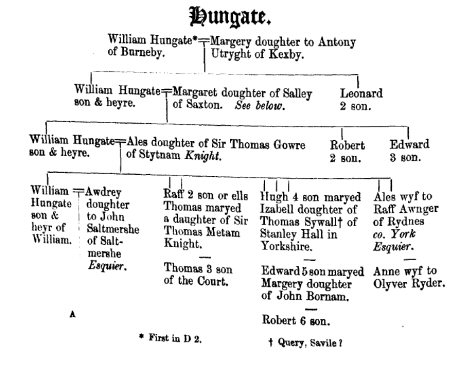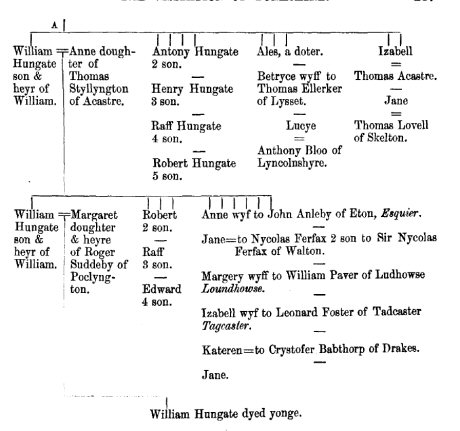

The Hungates were one of the most ancient families in
Yorkshire, and were inter-married with the leading families of
the county. They stoutly refused to conform to the new
religion, in spite of persecution by fine and imprisonment. Sir
Philip's father, William Hungate, Esq., was a very great sufferer
for the faith, as, indeed, were all his children and their mother.
Her maiden name was Margaret Sotheby, daughter and heiress
of Roger Sotheby, of Pocklington, Esq., and because she would
not abjure the faith she was imprisoned by the northern inquisi
tion, under the lord president of the north, in Sheriff Hutton
Castle, with numbers of other Yorkshire ladies. Her children
were equally staunch in their religion. The eldest son, Sir
William Hungate, Knt, married Jane, daughter of George Middleton, of Leighton Hall, co. Lancaster, Esq., but died
without surviving issue in 1634, his second son, Francis,
having accompanied his uncle, the Rev. George Middleton, to
the English college at Valladolid, in 1632, and died there in
1633 ; Roger Augustine, O.S.B., born in 1584, educated at
the English secular college at Douay,and professed at Montserrat,
served the Yorkshire mission till his death, Jan. 2, 1672,
having held the office of president-general of his order from
1 66 1 -9 ; Thomas, O.S.B., educated at Douay, was professed
in Spain, and died on the English mission in 1657 ; Robert
Gregory, O.S.B., also educated at the English college at Douay,
afterwards was professed at the Benedictine college there, in
1610, and, passing to the English mission in Yorkshire, was
appointed provincial of York in 1653, and died before the
expiration of his office ; Sir Philip, referred to above ; Elizabeth, married first to Sir Marmaduke Grimston, Knt. and
secondly to Sir Henry Browne, Knt. ; Mary, married first
to Richard Cholmeley, of Brandesby, Esq., and secondly to Sir
William Howard, third son of Lord William Howard, of
Naworth ; and Katharine, wife of Sir Gilbert Stapleton, of
Carlton. The second daughter, Mary, was married to Richard
Cholmeley by an old priest named Francis Smith, in Jan. 1602, " in a close in Saxton parish, about ten of the clock in the night."
This was the subject of another inquisition, and brought down
fresh troubles upon the heads of the devoted family.
|

